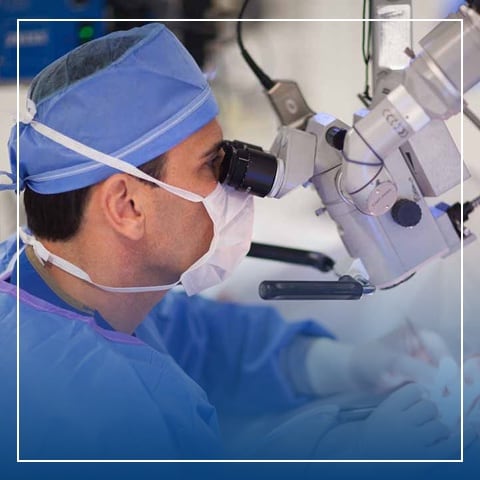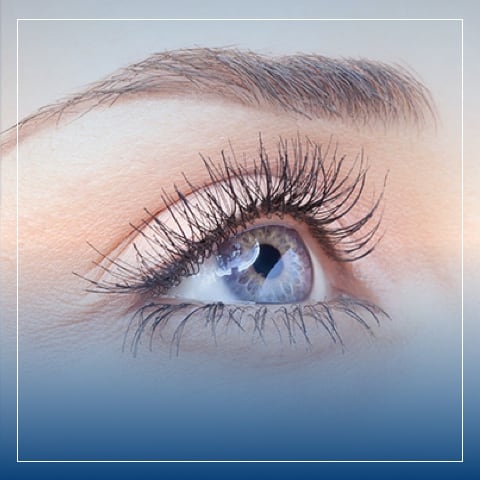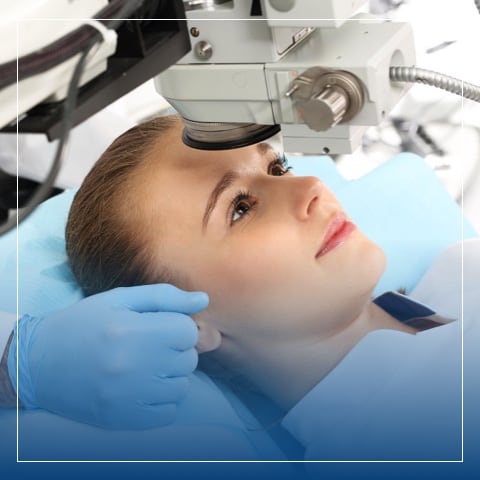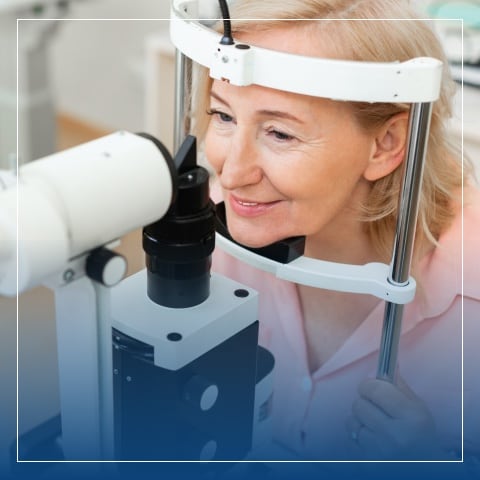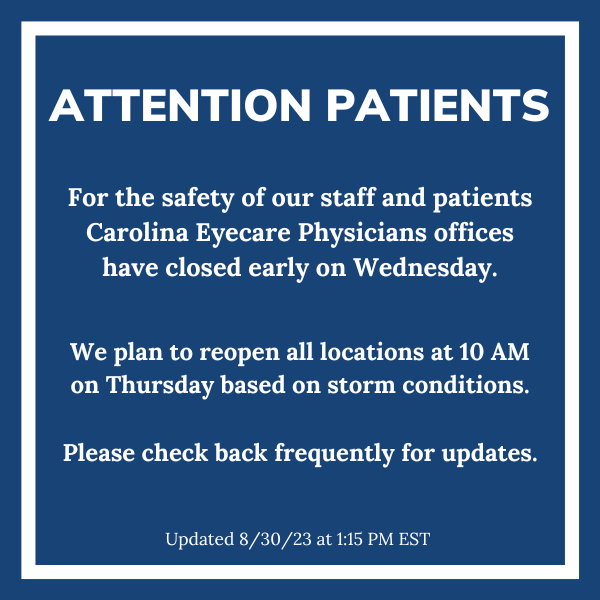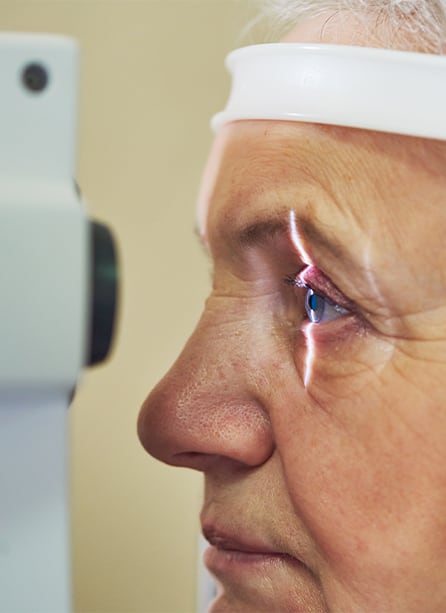

Retina Care
How much do you know about your retina health? Preventing and treating retina conditions are crucial for preserving your vision. Carolina Eyecare Physicians can help patients manage and treat retina conditions.
What Is the Retina?
The retina is the light-sensitive tissue lining the back of our eye. Light rays are focused onto the retina through our cornea, pupil and lens. The retina converts the light rays into impulses that travel through the optic nerve to our brain, where they are interpreted as the images we see. A healthy, intact retina is key to clear vision.
The middle of our eye is filled with a clear gel called vitreous that is attached to the retina. Sometimes tiny clumps of gel or cells inside the vitreous will cast shadows on the retina, and you may sometimes see small dots, specks, strings or clouds moving in your field of vision.
These are called floaters. You can often see them when looking at a plain, light background, like a blank wall or blue sky.
As we get older, the vitreous may shrink and pull on the retina. When this happens, you may notice what look like flashing lights, lightning streaks or the sensation of seeing “stars.” These are called flashes.

Retina Conditions
Regular comprehensive eye exams are essential for preventing and detecting many conditions that can affect the retina. The sooner a problem is diagnosed, the earlier patients can begin retinal tear treatment.
Who is at Risk?
People with the following conditions have an increased risk for retinal detachment:
- Nearsightedness
- Previous cataract, glaucoma or other eye surgery
- Glaucoma medications that make the pupil small
- Severe eye injury
- Previous retinal detachment in the other eye
- Family history of retinal detachment
- Weak areas in the retina that can be seen by an ophthalmologist during an eye exam
Symptoms of a Detached or Torn Retina
Symptoms of a retinal tear and a retinal detachment can include the following:
- A sudden increase in size and number of floaters, indicating a retinal tear may be occurring
- A sudden appearance of flashes, which could be the first stage of a retinal tear or detachment
- Having a shadow appear in the periphery (side) of your field of vision
- Seeing a gray curtain moving across your field of vision
- A sudden decrease in your vision
Floaters and flashes in themselves are quite common and do not always mean you have a retinal tear or detachment. However, if they are suddenly more severe and you notice you are losing vision, you should call your ophthalmologist right away.
Causes of Retina Conditions
As we get older, the vitreous may change shape, pulling away from the retina. If the vitreous pulls a piece of the retina with it, it causes a retinal tear. Once a retinal tear occurs, vitreous fluid may seep through and lift the retina off the back wall of the eye, causing the retina to detach or pull away.
Vitreous fluid normally shrinks as we age, and this usually doesn’t cause damage to the retina. However, inflammation (swelling) or nearsightedness (myopia) may cause the vitreous to pull away and result in retinal detachment.
How are Retinal Conditions Diagnosed?
Your retina eye specialist can diagnose retinal tear or retinal detachment during an eye examination where he or she dilates (widens) the pupils of your eyes. Only after careful examination can your ophthalmologist tell whether a retinal tear or early retinal detachment is present. Some retinal detachments are found during a routine eye examination. That is why it is so important to have regular eye exams.
After successful retina laser surgery or retina detachment surgery, vision may take many months to improve and, in some cases, may never return fully. Unfortunately, some patients do not recover any vision. The more severe the detachment, the less vision may return. For this reason, it is very important to see your ophthalmologist regularly or at the first sign of any trouble with your vision.

Types of Treatment
We offer a variety of treatment options for retinal conditions.
Surgery
Most retinal tears need to be treated by sealing the retina to the back wall of the eye with laser surgery or cryotherapy (a freezing treatment). Both of these procedures create a scar that helps seal the retina to the back of the eye. This prevents fluid from traveling through the tear and under the retina, which usually prevents the retina from detaching. These treatments cause little or no discomfort and may be performed in your ophthalmologist’s office.
Scleral Buckle
This treatment involves placing a flexible band (scleral buckle) around the eye to counteract the force pulling the retina out of place. The ophthalmologist often drains the fluid under the detached retina, allowing the retina to settle back into its normal position against the back wall of the eye. This procedure is performed in an operating room.
Pneumatic Retinopexy
In this procedure, a gas bubble is injected into the vitreous space inside the eye in combination with laser surgery or cryotherapy. The gas bubble pushes the retinal tear into place against the back wall of the eye. Sometimes this procedure can be done in the ophthalmologist’s office. Your ophthalmologist will ask you to constantly maintain a certain head position for several days. The gas bubble will gradually disappear.
Vitrectomy
This surgery is commonly used to fix a retinal detachment and is performed in an operating room. The vitreous gel, which is pulling on the retina, is removed from the eye and usually replaced with a gas bubble.
Sometimes an oil bubble is used (instead of a gas bubble) to keep the retina in place. Your body’s own fluids will gradually replace a gas bubble. An oil bubble will need to be removed from the eye at a later date with another surgical procedure. Sometimes vitrectomy is combined with a scleral buckle.
If a gas bubble was placed in your eye, your ophthalmologist may recommend that you keep your head in special positions for a time. Do not fly in an airplane or travel at high altitudes until you are told the gas bubble is gone. A rapid increase in altitude can cause a dangerous rise in eye pressure. With an oil bubble, it is safe to fly on an airplane.
Protect Your Retina Health
Every part of your eye deserves care. Protecting your retina health is essential for functioning vision. Booking regular eye exams can help your eye care team monitor your retina health and vision. At Carolina Eyecare Physicians, our eye doctors have the training and expertise to help our patients preserve their eye health.
Locations
We have several convenient locations throughout South Carolina. Please view the nearest location to you or get directions below.
Our Services

See Our Google Reviews

News
Natural Remedies for Dry Eye Relief: What Works?
Dry EyeDry eye syndrome can leave your eyes feeling uncomfortable, appearing red, or as though sand is trapped within them, often resulting in a burning or stinging sensation. This condition arises when the small glands around your eyelids fail to produce enough tears, which is vital for keeping your eyes moist, clear, and healthy. Are you […]
Read More… from Natural Remedies for Dry Eye Relief: What Works?
Eye Safety Tips for the Solar Eclipse
News & UpdatesHello eclipse enthusiasts! With the much-anticipated solar eclipse just around the corner, the team at Carolina Eyecare Physicians wants to make sure you’re all set to enjoy this celestial marvel safely. As your trusted eye care providers here in Charleston, South Carolina, we’re sharing some friendly reminders to help protect your vision during the big […]
5 Unexpected Benefits of LASIK Treatment You Might Not Know About
LASIK, LASIK SurgeryFor many, getting LASIK surgery is motivated by the simple desire to ditch their glasses or contact lenses for good. However, what often goes unnoticed are the subtle yet profound benefits of this modern corrective eye procedure. Beyond the obvious allure of improved vision, LASIK vision correction treatment offers advantages that can greatly enhance your […]
Read More… from 5 Unexpected Benefits of LASIK Treatment You Might Not Know About
Natural Remedies for Dry Eye Relief: What Works?

Dry eye syndrome can leave your eyes feeling uncomfortable, appearing red, or as though sand is trapped within them, often resulting in a burning or stinging sensation. This condition arises when the small glands around your eyelids fail to produce enough tears, which is vital for keeping your eyes moist, clear, and healthy. Are you […]
Read More… from Natural Remedies for Dry Eye Relief: What Works?
Eye Safety Tips for the Solar Eclipse

Hello eclipse enthusiasts! With the much-anticipated solar eclipse just around the corner, the team at Carolina Eyecare Physicians wants to make sure you’re all set to enjoy this celestial marvel safely. As your trusted eye care providers here in Charleston, South Carolina, we’re sharing some friendly reminders to help protect your vision during the big […]
5 Unexpected Benefits of LASIK Treatment You Might Not Know About
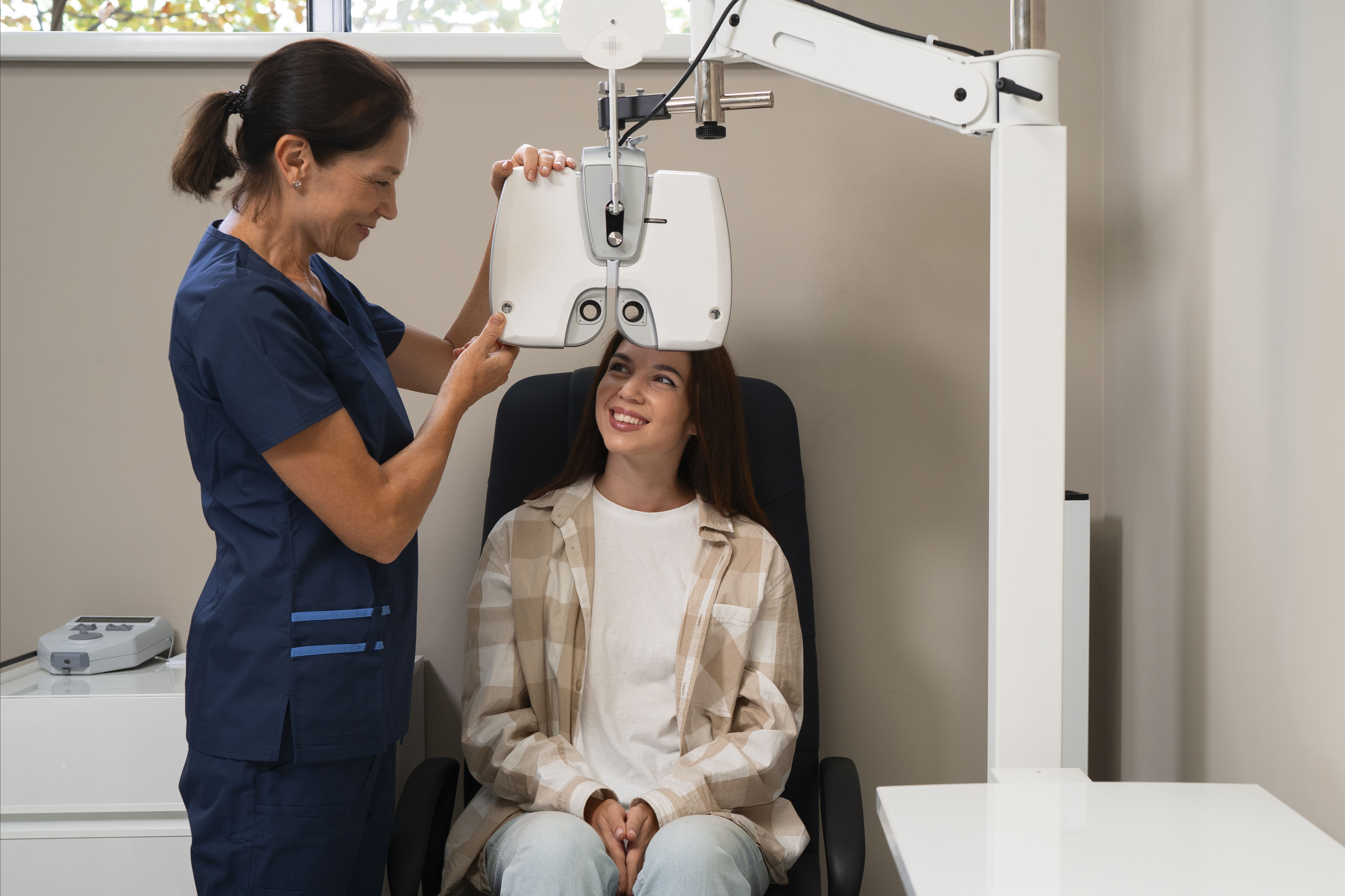
For many, getting LASIK surgery is motivated by the simple desire to ditch their glasses or contact lenses for good. However, what often goes unnoticed are the subtle yet profound benefits of this modern corrective eye procedure. Beyond the obvious allure of improved vision, LASIK vision correction treatment offers advantages that can greatly enhance your […]
Read More… from 5 Unexpected Benefits of LASIK Treatment You Might Not Know About


We are a proud partner of US Eye, a leading group of patient-centric, vertically integrated multi-specialty physician practices providing patients with care in ophthalmology, optometry, dermatology, audiology, and cosmetic facial surgery.

